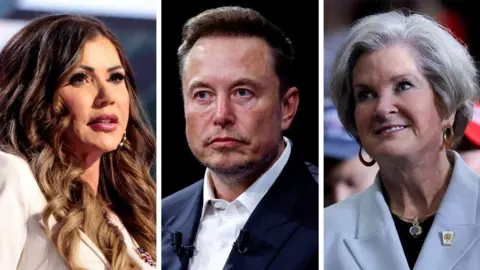 Getty Images
Getty ImagesThe new team entrusted with delivering Donald Trump’s agenda is taking shape, with several contentious hires in his proposed administration.
Ahead of his return to the White House on 20 January 2025, the president-elect has named Pete Hegseth, a Fox News host and military veteran, as his pick for defence secretary. And he wants Robert F Kennedy Jr to be health secretary.
Marco Rubio could be the next secretary of state. And billionaire supporter Elon Musk will play a role in cost-cutting.
Here is a closer look at the posts he has named replacements for, and the names in the mix for the top jobs yet to be filled.
We will start with the cabinet roles, which require approval from the US Senate. If four Republican senators and all the Democrats disagree to any individual then that nomination will fail.
Secretary of state – Marco Rubio
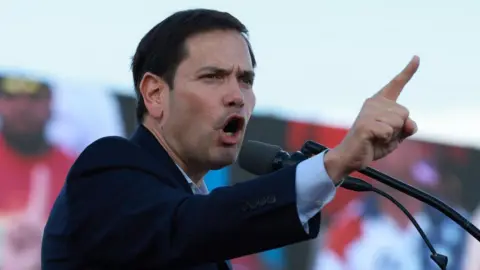 Getty Images
Getty ImagesFlorida Senator Marco Rubio has been picked for US secretary of state – the president’s main adviser on foreign affairs, who acts as America’s top diplomat when representing the country overseas.
Rubio, 53, takes a hawkish view of China. He opposed Trump in the 2016 Republican primary but has since mended fences.
He has long been courting the job of the nation’s top diplomat and if approved, he will be the first Latino secretary of state in US history.
Defence secretary – Pete Hegseth
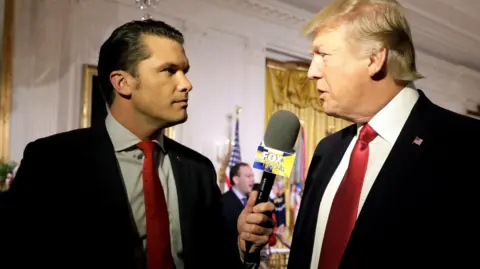 Reuters
ReutersPete Hegseth, a military veteran and Fox News host who has never held political office, has been nominated to be the next defence secretary.
His appointment is one of the most highly anticipated in Trump’s cabinet as the wars in Ukraine and Gaza rage on. “Nobody fights harder for the troops,” Trump said.
After Hegseth’s appointment, it emerged that he was investigated in 2017 for an alleged sexual assault. He was never arrested or charged and denies the allegation.
His lawyer also confirmed that he had paid a woman in the same year to stay quiet about an assault claim that he feared would cost him his job at Fox. Again, he denied any wrongdoing.
Attorney general – Pam Bondi
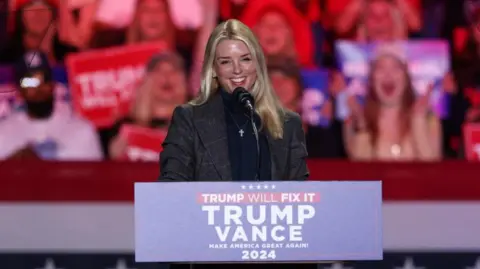 Reuters
ReutersTrump’s first pick for attorney general, former Florida Congressman Matt Gaetz, withdrew from consideration for the role Thursday after a week of controversy over a congressional investigation into sexual misconduct and drug allegations against him.
Gaetz denied all of the claims, but said he wanted to avoid a “needlessly protracted Washington scuffle.”
About six hours after Gaetz withdrew, Trump named Pam Bondi, a former Florida attorney general, as his successor.
“Pam was a prosecutor for nearly 20 years, where she was very tough on Violent Criminals, and made the streets safe for Florida Families,” Trump wrote.
Bondi served during Trump’s first administration as a member of the Opioid and Drug Abuse Commission. And she was on his defence team during his first impeachment trial.
Department of the interior – Doug Burgum
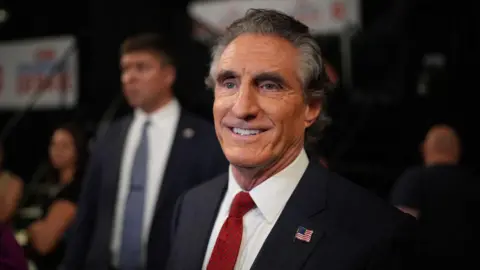 Getty Images
Getty ImagesTrump announced during a speech at Mar-a-Lago that he would ask Doug Burgum, the governor of North Dakota, to lead the Department of the Interior.
A software entrepreneur who sold his small company to Microsoft in 2001, Burgum briefly ran in the 2024 Republican primary before dropping out, endorsing Trump and quickly impressing him with his low-drama persona and sizeable wealth.
If confirmed, Burgum will oversee an agency that is responsible for the management and conservation of federal lands and natural resources.
Health and human services – Robert F Kennedy Jr
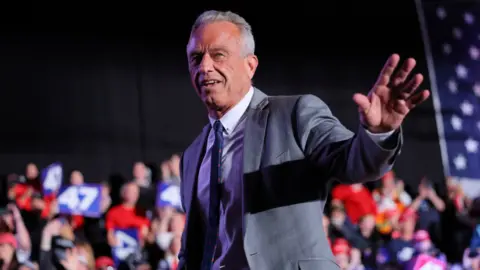 Reuters
ReutersRFK Jr, as he is known, an environmental lawyer, vaccine sceptic and the nephew of former President John F Kennedy, is Trump’s pick to lead the Department of Health and Human Services.
Despite having no medical qualifications, Kennedy, 70, would have broad remit over US federal health agencies – including those that oversee approval of vaccines and pharmaceuticals.
There has been speculation about his inability to pass a background check for security clearance due to past controversies, including dumping a bear carcass in New York’s Central Park.
Some of Kennedy’s own stated aims for government are bound up with misinformation – and many medical experts have expressed serious concerns about his nomination, citing his views on vaccines and other health matters.
On other matters he has more support, for example in scrutinising the processing of food and the use of additives.
Veterans’ affairs – Doug Collins
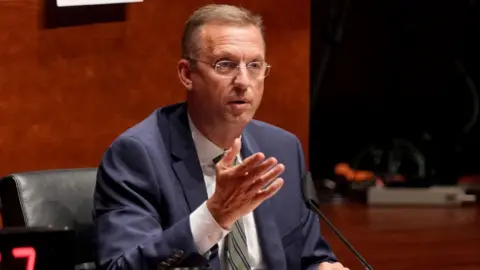 Getty Images
Getty ImagesFormer Georgia congressman Doug Collins has been chosen to lead the US Department of Veterans’ Affairs.
Collins was a Trump loyalist when he served in Congress from 2013-21. He was an outspoken advocate for the president-elect during both impeachment hearings.
An Iraq war veteran who now serves as a chaplain in the US Air Force Reserve, Collins left Congress for an unsuccessful bid for the Senate in his home state of Georgia.
Homeland security – Kristi Noem
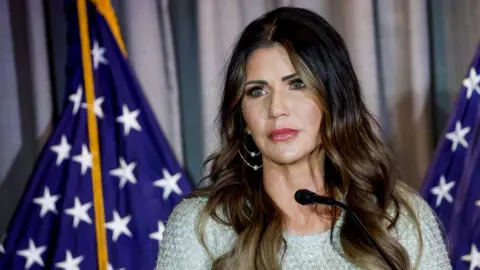 Getty Images
Getty ImagesSouth Dakota Governor Kristi Noem has been nominated for the key role of overseeing US security, including its borders, cyber-threats, terrorism and emergency response.
The agency has a $62bn (£48bn) budget and employs thousands of people. It incorporates a wide variety of agencies under its umbrella, ranging from Customs and Border Protection to the Federal Emergency Management Agency.
Transportation secretary – Sean Duffy
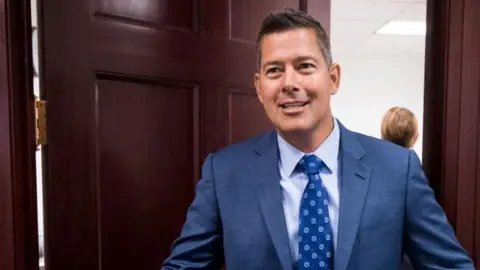 Getty Images
Getty ImagesFormer congressman and Fox Business host Sean Duffy has been selected to lead the Department of Transportation.
If confirmed by senators, he will take charge of aviation, automotive, rail, transit and other transportation policies at the transport department, with a roughly $110bn annual budget.
In the role, the incoming secretary can expect to face a number of safety-related aviation issues, including the continued problems at Boeing, as the troubled manufacturer addresses a series of safety and quality issues.
Energy secretary – Chris Wright
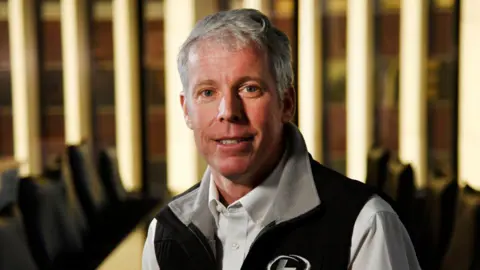 Getty Images
Getty ImagesOil and gas industry executive Chris Wright will lead the Department of Energy, where he is expected to fulfill Trump’s campaign promise to “drill, baby, drill” and maximise US energy production.
Wright, the founder-CEO of Liberty Energy, has called climate activists alarmist and likened Democrats’ push for renewables to Soviet-style communism.
In a video posted to his LinkedIn profile last year, he said: “There is no climate crisis, and we’re not in the midst of an energy transition either.”
Commerce secretary – Howard Lutnick
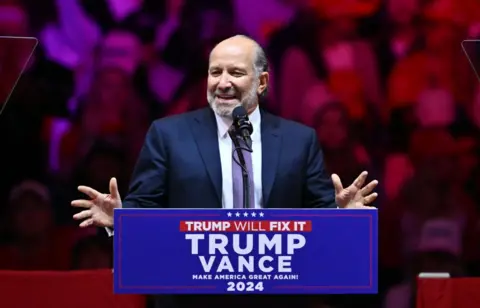 Reuters
ReutersHoward Lutnick, the co-chair of Trump’s transition team and chief executive of financial firm Cantor Fitzgerald, has been picked to lead the US commerce department.
Trump said Lutnick would spearhead the administration’s “tariff and trade agenda”.
Lutnick had also been in the running for treasury secretary, a more high-profile role.
Education secretary – Linda McMahon
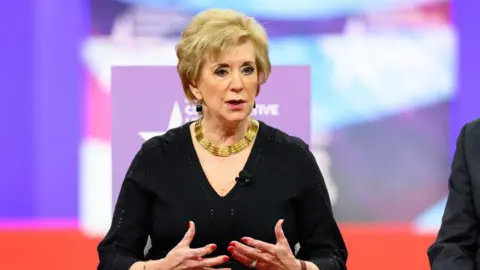 Getty Images
Getty ImagesWorld Wrestling Entertainment (WWE) co-founder and Trump transition co-chair, Linda McMahon, has been appointed as Trump’s nominee for education secretary.
A long-time Trump ally, McMahon led the Small Business Administration during Trump’s first presidency and donated millions of dollars to his presidential campaign.
Trump has criticised the Department of Education, and has promised to close the agency down – a job McMahon could be tasked with.
In his statement announcing her nomination, Trump said McMahon would “spearhead” the effort to “send Education BACK TO THE STATES”, in reference to the pledge.
Treasury secretary – Scott Bessent
 Getty Images
Getty ImagesScott Bessent has been nominated to lead the US Treasury Department, a post with wide oversight of tax policy, public debt, international finance and sanctions.
The selection ends what has proven to be one of the more protracted decisions for the president-elect as he assembles his team for a second term.
Bessent, a Wall Street financier who once worked for liberal billionaire George Soros, was an early backer of Trump’s 2024 bid and would bring a relatively conventional resume to the role.
On the campaign trail, Bessent told voters that Trump would usher in a “new golden age with de-regulation, low-cost energy, (and) low taxes”.
“(He) has long been a strong advocate of the America First Agenda,” Trump said, adding that Bessent would “support my Policies that will drive US Competitiveness, and stop unfair Trade imbalances.”
Office of Management and Budget – Russell Vought
 Getty Images
Getty ImagesRussell Vought has been selected to lead the Office of Management and Budget, a post he held during Trump’s first term.
Vought previously served as the director of the agency, which helps craft the president’s budget, acts as the central regulatory gatekeeper and executes the president’s agenda across the government.
He also authored a key chapter in Project 2025, a 900-page conservative wish-list that sought to expand presidential power and impose an ultra-conservative social vision.
Vought served as the Republican National Committee’s 2024 platform policy director.
“He did an excellent job serving in this role in my First Term,” Trump said in announcing Vought. “We cut four Regulations for every new Regulation, and it was a Great Success!”
Labour secretary – Lori Chavez-DeRemer
 Getty Images
Getty ImagesLori Chavez-DeRemer has been selected by Trump to lead the US Department of Labor – which oversees worker health and safety, workforce laws and administers unemployment and workers compensation.
Chavez-DeRemer has been serving in the US Congress since 2023 but lost a re-election bid in Oregon in the November election, despite winning strong trade union support.
Housing secretary – Scott Turner
 Getty Images
Getty ImagesScott Turner, an NFL veteran and motivational speaker, has been chosen to lead the US Department of Housing and Urban Development.
The department oversees America’s housing needs, enforces laws, prevents discrimination and provides assistance to those in need, through both low-income housing and helping Americans avoid foreclosure.
Turner served as the executive director of the White House Opportunity and Revitalization Council during Trump’s first term. He previously served in the Texas legislature.

Outside the 15 department heads who make up the core of the cabinet, there are several other roles that are often given cabinet-rank, like the FBI director and the head of the Environment Protection Agency (EPA). These roles will also require the nominees to be confirmed by the Senate.
However, there will be other key roles in the Trump administration that will not require Senate confirmation and the people filling these roles – like Elon Musk – will not have to be vetted in the same way.
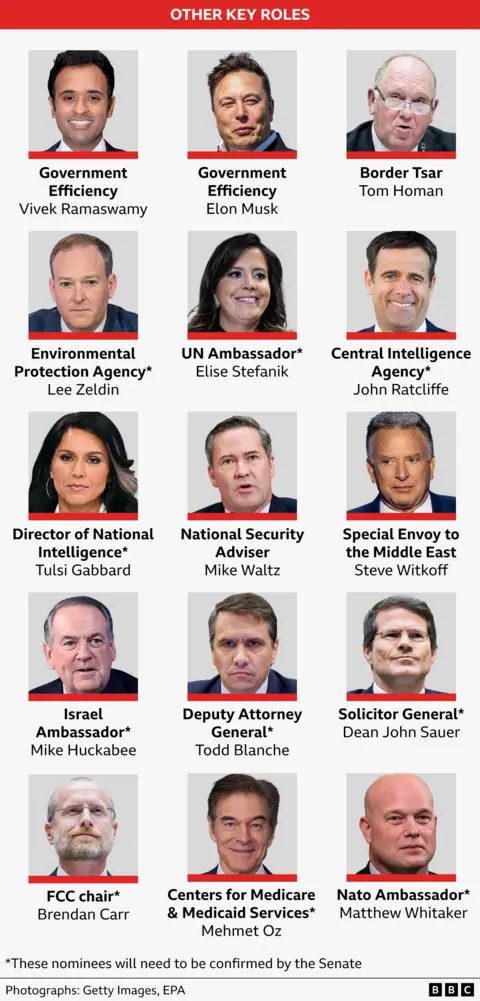
Department of Government Efficiency – Elon Musk and Vivek Ramaswamy
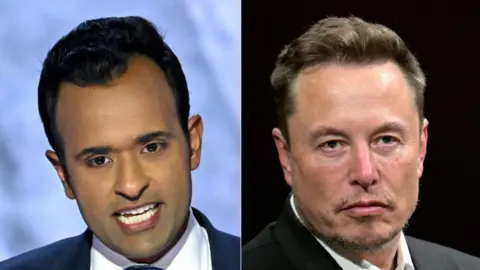 Getty Images
Getty ImagesBillionaire entrepreneur Elon Musk, the world’s richest man, has been tapped to lead what Trump has termed a Department of Government Efficiency, alongside one-time presidential hopeful Vivek Ramaswamy.
The department – whose acronym Doge is a nod to a cryptocurrency promoted by Musk – will serve in an advisory capacity to “dismantle government bureaucracy, slash excess regulations, cut wasteful expenditures and restructure federal agencies”, Trump said.
It is unclear what approval process will be necessary for these roles.
Border tsar – Tom Homan
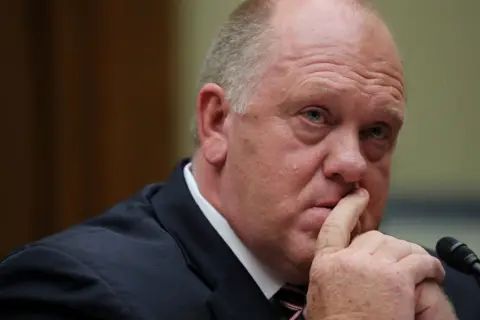 Reuters
ReutersThis is a critical job because it includes responsibility for Trump’s mass deportations of millions of undocumented migrants, which was a central campaign pledge.
Homan is a former police officer who was acting director of the US Immigration and Customs Enforcement (Ice) in Trump’s first term and has advocated a zero-tolerance stance on the issue.
“I will run the biggest deportation force this country has ever seen,” he said in July.
Head of Environmental Protection Agency – Lee Zeldin
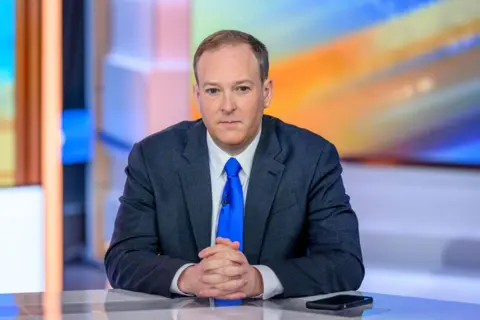 Getty Images
Getty ImagesLee Zeldin, a former New York congressman, has agreed to lead the Environmental Protection Agency (EPA), both he and Trump said. The Senate will still need to confirm his appointment.
He will be in charge of tackling America’s climate policy in this role.
While serving in congress from 2015 to 2023, Zeldin voted against expanding a number of environmental policies. He has already said he plans to “roll back regulations” from day one.
United Nations ambassador – Elise Stefanik
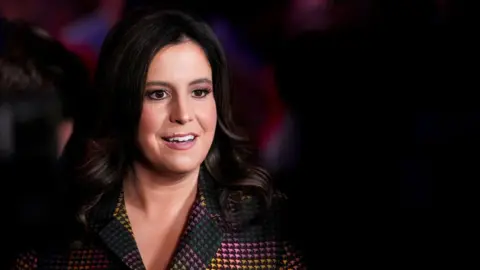 Getty Images
Getty ImagesNew York Congresswoman Elise Stefanik has been tapped to serve as the US ambassador to the United Nations.
Stefanik has made national headlines with her sharp questioning in congressional committees.
Intelligence and national security posts
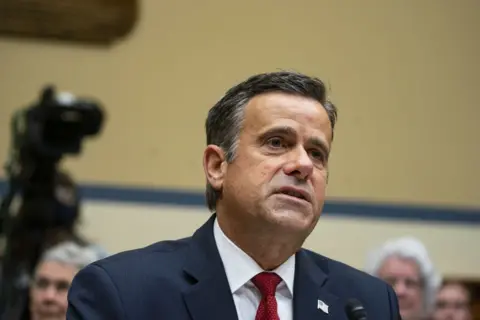 Getty Images
Getty ImagesTrump has chosen his former director of national intelligence, ex-Texas congressman John Ratcliffe, to serve as Central Intelligence Agency (CIA) director.
There are other yet-to-be-appointed key positions running intelligence agencies, including the FBI and director of national intelligence.
Trump has said he would fire FBI Director Chris Wray, whom he nominated in 2017, but has since fallen out with. Jeffrey Jensen, a former Trump-appointed US attorney, has been under consideration to replace Wray.
Director of national intelligence – Tulsi Gabbard
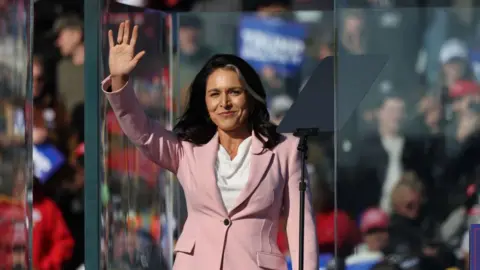 Getty Images
Getty ImagesTrump has named former Democratic congresswoman from Hawaii, Tulsi Gabbard, as director of national intelligence.
The former US Army Reserve officer once campaigned with Senator Bernie Sanders and ran for president as a Democrat in 2020, but has turned toward the Republicans in recent years.
She campaigned with Trump in 2024 and served on his transition team.
National security adviser – Mike Waltz
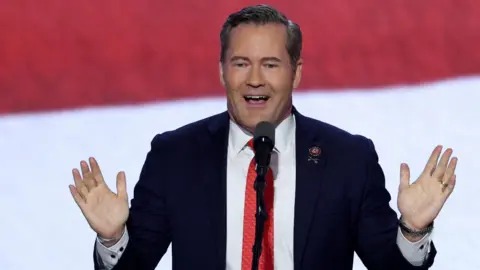 Reuters
ReutersFlorida congressman Michael Waltz has been selected as the next national security adviser.
In a statement on Tuesday announcing Waltz’s appointment, Trump noted that Waltz is the first green beret – or member of the US Army Special Forces – to be elected to Congress.
Waltz will have to help navigate the US position on the wars in the Middle East and Ukraine.
Special envoy to the Middle East – Steve Witkoff
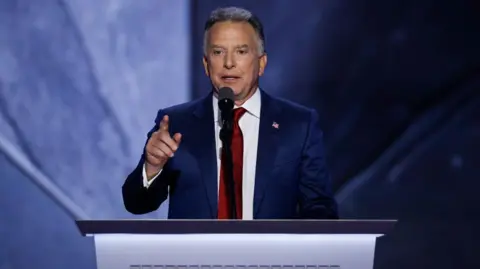 Getty Images
Getty ImagesTrump has picked real estate investor and philanthropist Steve Witkoff for the role of special envoy to the Middle East.
Witkoff is a close friend of Trump’s, who was with the former president when a man allegedly tried to assassinate him at his Palm Beach golf club in September.
Trump has described him as a “highly respected leader in business and philanthropy, who has made every project and community he has been involved with stronger and more prosperous”.
US ambassador to Israel – Mike Huckabee
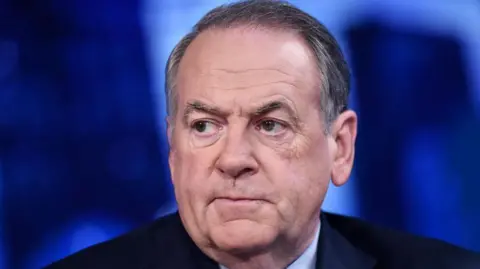 Getty Images
Getty ImagesFormer Arkansas Governor Mike Huckabee will be US ambassador to Israel, as Trump pledges to end the ongoing conflict in the Middle East.
“Mike has been a great public servant, governor, and leader in faith for many years,” the president-elect said in a statement.
Huckabee is a staunchly pro-Israel official who has previously rejected the idea of a two-state solution to solve the Israel-Palestinian conflict.
Ambassador to Nato – Matthew Whitaker
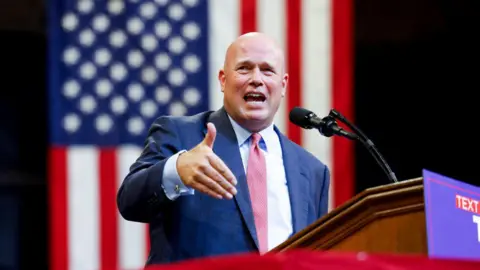 Reuters
ReutersFormer acting Attorney General Matthew Whitaker has been nominated to be the US Ambassador to Nato – the alliance Trump has regularly criticised, and has even previously threatened to withdraw from completely.
“Matt is a strong warrior and loyal Patriot, who will ensure the United States’ interests are advanced and defended,” Trump said in a statement.
“Matt will strengthen relationships with our Nato Allies, and stand firm in the face of threats to Peace and Stability – He will put AMERICA FIRST.”
Whitaker is a high school football star turned lawyer who has served as a US Attorney for the Southern District of Iowa. He has little experience of foreign policy.
Solicitor general – Dean John Sauer
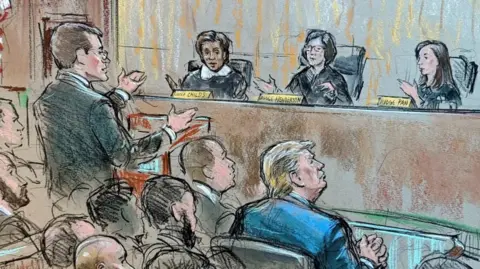 Reuters/Bill Hennessy
Reuters/Bill HennessyTrump has selected Dean John Sauer to be US solicitor general to supervise and conduct government litigation in the US Supreme Court.
Sauer previously served as solicitor general for the Missouri state supreme court for six years, and worked as a clerk for former US Supreme Court Justice Antonin Scalia.
He also represented Trump earlier this year in several of his court cases, including his US Supreme Court immunity case.
Federal Communications Commission chair – Brendan Carr
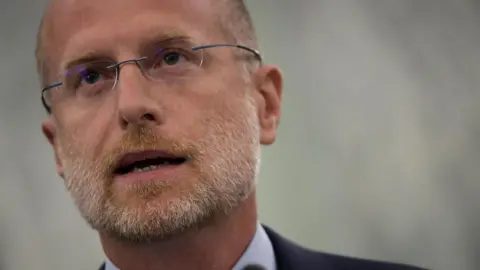 Reuters
ReutersBrendan Carr is a current member of the Federal Communications Commission (FCC), which regulates broadcast and internet use. A longtime establishment Republican, in recent years he has embraced Trump’s priorities and emerged as a supporter of regulation of “big tech”.
“Facebook, Google, Apple, Microsoft and others have played central roles in the censorship cartel,” he wrote on X. “The censorship cartel must be dismantled.”
Trump has previously vowed to strip TV channels he considers biased of their broadcasting licenses.
Centers for Medicare & Medicaid Services – Mehmet Oz
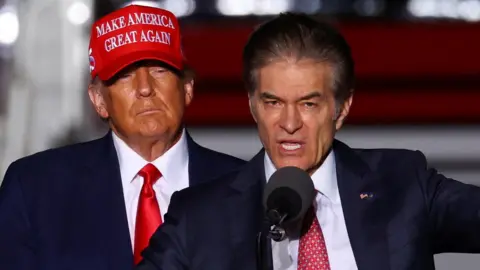 Reuters
ReutersMehmet Oz has been chosen to run the powerful agency that oversees the healthcare of millions of Americans. He, too, will need to be confirmed by the US Senate next year before he officially takes charge.
Oz trained as a surgeon before finding fame on The Oprah Winfrey Show in the early 2000s. He later hosted a TV programme of his own.
“There may be no physician more qualified and capable than Dr Oz to make America healthy again,” Trump said.
Oz has been criticised by experts for promoting what they called bad health advice about weight loss drugs and “miracle” cures, and suggesting malaria drugs as a cure for Covid-19 in the early days of the pandemic.

These jobs are in the West Wing – his key advisers.
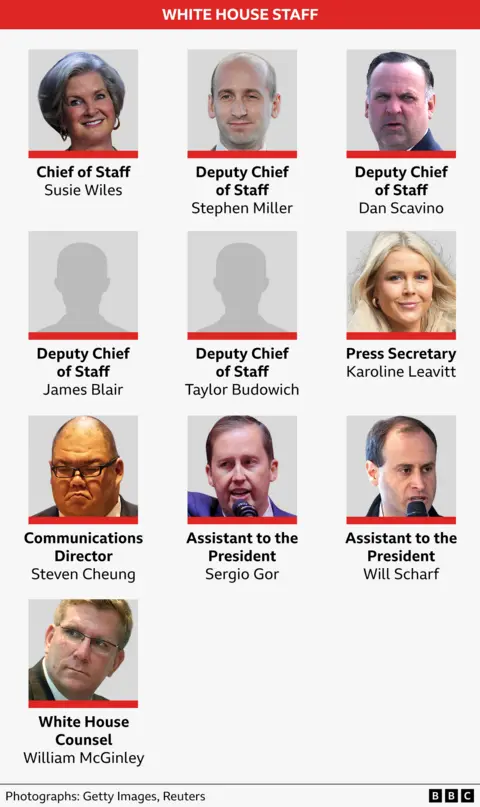
Chief of staff – Susie Wiles
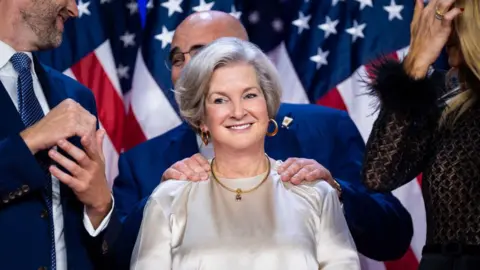 Getty Images
Getty ImagesSusie Wiles and campaign co-chair Chris LaCivita were the masterminds behind Trump’s victory over Kamala Harris.
The chief of staff is a cabinet member and often a president’s top aide, overseeing daily operations in the West Wing and managing the boss’s staff.
Wiles, 67, has worked in Republican politics for decades, from Ronald Reagan’s successful 1980 presidential campaign to electing Rick Scott and Ron DeSantis as governors of Florida.
Deputy chief of staff – Stephen Miller
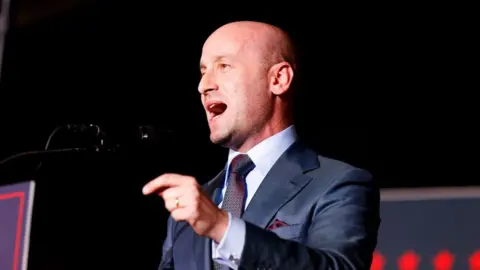 Getty Images
Getty ImagesStephen Miller, who has been Trump’s close adviser and speechwriter since 2015, is Trump’s choice for White House deputy chief of staff for policy.
He will likely shape any plans for mass deportations – and pare back both undocumented and legal immigration.
During Trump’s first term, Miller was involved in developing some of the administration’s strictest immigration policies.
White House counsel – William McGinley
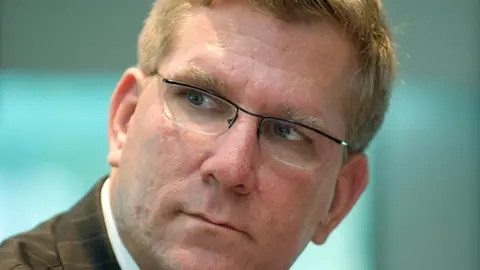 Getty Images
Getty ImagesRepublican lawyer William McGinley will take on the role of White House counsel, Trump has said.
“Bill is a smart and tenacious lawyer who will help me advance our America First agenda while fighting for election integrity and against the weaponization of law enforcement,” he said in a statement.
McGinley served as White House cabinet secretary during part of Trump’s first term and was the Republican National Committee’s counsel for election integrity in 2024.
Press secretary – Karoline Leavitt
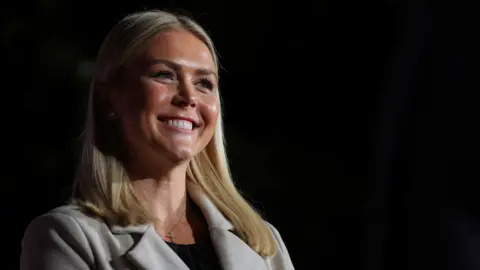 Reuters
ReutersKaroline Leavitt, 27, will become the youngest person to serve as White House press secretary in US history when Donald Trump returns to office.
She ran for Congress, winning the Republican nomination for New Hampshire in 2022, only to lose in the general election to Democrat Chris Pappas.
Leavitt also served in the White House press office during the first Trump administration, including as an assistant press secretary, according to the website for her run for Congress.
The public will soon see Leavitt in the iconic spot behind the podium in the White House briefing room – a space that led to countless tense exchanges between members of the press and officials in Trump’s first administration.
Communications director – Steven Cheung
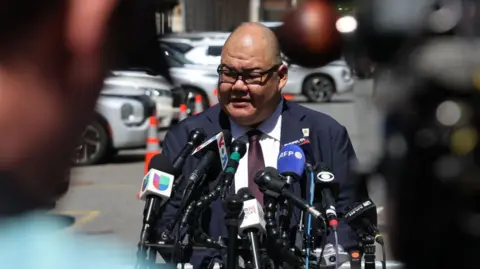 Getty Images
Getty ImagesSteven Cheung joined Trump’s team in 2016 as his campaign spokesman, and will soon take on a top communications role in the White House.
Raised by Chinese immigrant parents in California, Cheung started out as an intern under then-California Governor Arnold Schwarzenegger. He has also been the spokesman for the Ultimate Fighting Championship (UFC).
Cheung became known for his fierce, and often offensive, attacks towards Trump’s opponents. He has said Joe Biden “slowly shuffles around like he has a full diaper in his pants” and Florida Governor Ron DeSantis walks like a girl who “discovered heels for the first time”.
During his first administration, Trump had an unusually high turnover of communications directors – six different people. Anthony Scaramucci infamously only lasted 11 days in the role.
Assistant to the president – Sergio Gor
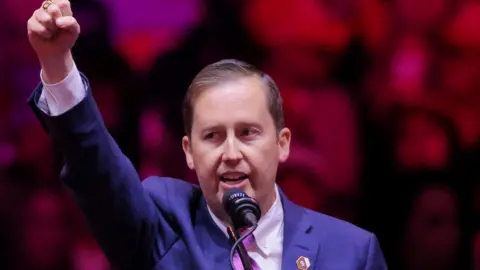 Reuters
ReutersSergio Gor is a business partner of Trump’s son, Donald Jr. He is the president and co-founder of the younger Trump’s publishing company, Winning Team Publishing, which has published a book by the president-elect.
“Steven Cheung and Sergio Gor have been trusted advisers since my first presidential campaign in 2016, and have continued to champion America First principles,” Trump said in a statement.

